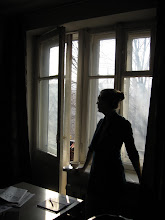
Yesterday I met up with Akerke and some other students at the National Conservatory, where they were busy rehearsing some arrangements of Kazakh traditional instrumental pieces called kyui. The word kyui means "frame of mind" or "mood" and they either tell a story or set up an atmosphere that is suggested by the title of the piece. There's usually a background story that goes along with every kyui and explains something about why and how it was composed.
So, this student ensemble was made up of five instruments (from right to left): dombra (long-necked lute), kobyz, saz sirnai (ocarina, or clay whistle), accordion, and prima-kobyz (a modernized version of kobyz that looks and sounds much like a violin). This type of ensemble, and its mixing of traditional instruments and modernized (or non-Kazakh) instruments, is pretty typical. It's kind of a legacy of Soviet times, when large folk orchestras combined Kazakh and non-Kazakh instruments and performed arrangements of traditional pieces. Nowadays, you also find ensembles made up entirely of traditional Kazakh instruments, referred to as "ethnographic" ensembles. I should point out, though, that ensembles are sort of antithetical to Kazakh kyui in the first place, since they were originally intended for SOLO performance!
The student group must have gone through about 6 or 7 pieces, playing most of them from memory. Akerke told me that in order to get into the Conservatory, you have to have memorized a large number of these kyui already, so these kids definitely know their stuff. When they corrected each other or discussed different ways of approaching the music, they used the typical Almaty mish-mash of Kazakh and Russian languages - it's really interesting to see how young Kazakhs negotiate the language issue by just using both!
I brought my kobyz along and of course had to show what I could do, which wasn't much since I haven't been practicing! I played one kyui that I always break out for demonstrations, called "Erden." It was written by Ykhlas in the early 20th century and it basically expresses the sorrow of the protagonist, Erden, over the death of his son. A sad but gorgeous piece!


3 comments:
great posts! I'm trying to catch up to you!!! See my posts about "the name" bejos
Neat stuff, lady :)
I've been getting Kazakhified all morning, all caught up now and love the blog. I'm so glad you are taking pics and letting us know all you are experiencing. The apartment looks great, Happy New Year to you! Glad you met up with some old friends and hope that your music lessons proceed as you want them to. Til the next blog... have fun.
Post a Comment